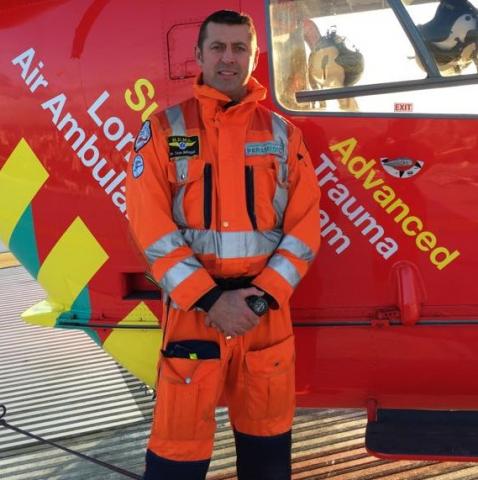9 Jan 2015

On the 26th April, advanced trauma paramedic Dean Bateman will be getting up early and making his way to Greenwich where he will join 40,000 others nervously contemplating the 26.2 miles ahead of them. You’ll spot him easily. He’ll be the one crossing the line in his London’s Air Ambulance flight suit.
Dean Bateman has 20 years of experience of responding to medical emergencies in ambulances, fast response cars and helicopters. He joined London’s Air Ambulance in 2005 and has undertaken several secondments since. As an emeritus advanced trauma paramedic he continues
to carry out regular shifts to maintain his advanced medical skills.
Enduring months of arduous preparation, Dean explains the motivation behind his decision to take part in the 2015 London Virgin Money Marathon to raise funds for London’s Air Ambulance.....
“The level of care provided by London’s Air Ambulance is second to none. Critically injured patients receive the care they need far quicker from us than from any other service. London’s Air Ambulance is a charity so to maintain this level of care for London, it needs funds. It needs our support.
I’ve completed a number of half marathons already to fundraise for the charity but this is my first full marathon, in my flight suit which is going to be pretty hot.
The hardest part so far has been finding the time to go for training runs. I spent a week in the Cotswolds over Christmas and was out running every day, which is not what you would normally expect to be doing at that time of year.
Fortunately I do a lot of weight-training and I’m a keen boxer so my fitness is reasonably good. As a paramedic you do have some tough days, when you see a lot of trauma. I’ve found playing a lot of sport is a good release from all that.”
The defining moment
Dean joined the London Ambulance Service in 1993 and qualified as a paramedic in 1996. It was during this time he knew he wanted to join London’s Air Ambulance. He can trace it back to a single defining moment:
“My desire to join London’s Air Ambulance dates back to when I was trainee ambulance technician. I was with my crewmate, in a block of flats in South London, tending a patient who had 90% burns. We requested the help of London’s Air Ambulance but were told the team was unavailable because it was on another job. Despite having done all we could to make the patient as comfortable as possible, we felt so helpless. We managed to get the patient into the lift and down to the ground floor. It was then that we heard this almighty noise, which was the aircraft landing. Unbeknown to us, because we didn’t have hand-held radios in those days, the team had been sent to assist us.
It was the biggest relief. Seeing the level of patient care the team provided and experiencing the amount of reassurance given to us, it was just phenomenal. From that day on I decided that I wanted to be that kind of paramedic, to provide that level of care. Not just for the patient but also to back up the ambulance service.”
Mental and physical toughness
Training for a marathon requires equal amounts of mental and physically toughness, something that as an advanced trauma paramedic, Dean is well prepared for.
“One of the hardest parts of this job is working in EOC (Emergency Operation Centre), listening to the 999 calls deciding whether to dispatch the team or not. Most paramedics will say the same. But when you get it right, and the advanced trauma team performs an intervention at scene, like a Rapid Sequence Induction (general anaesthesia), it’s so rewarding. You know you have increased the level of care for that patient just by asking the right questions.
On the day of the marathon, the thing that will keep me going and across the finish line is not wanting to let down the people who have sponsored me as their money is going to make a real difference to peoples lives."

